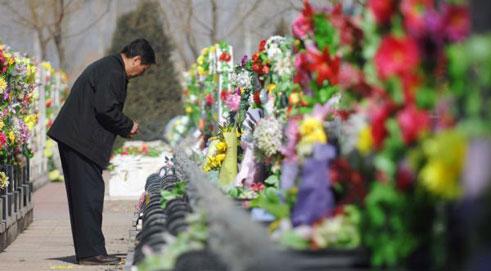
A citizen offers flowers as sacrifice to the deceased in a cemetery in Yinchuan, capital of northwest China's Ningxia Hui Autonomous Region, March 29, 2011. As the Tomb Sweeping Day approaches, which falls on April 5 this year, many people in Yinchuan chose to pay respect to the tombs of their deceased beloved ones with flowers instead of burning joss paper and setting off firecrackers which are harmful to environment. (Xinhua/Peng Zhaozhi)
BEIJING, March 31 (Xinhua) -- As low-carbon and green concepts become more popular, more Chinese are opting for environment-friendly ways to pay tribute to their ancestors and deceased loved ones.
Zhong Xiaoxing, a 55-year-old resident of Hohhot city in north China, bought silk flowers and would offer to his deceased father on annual Tomb-Sweeping Day, which falls on April 5 this year.
"In the past we would burn fake paper money for our ancestors on this special occasion. But presenting flowers or silk ones began gaining popularity in Hohhot last year and we have decided to shift to the new way of doing things," Zhong said.
"It is more environment-friendly," Zhong added.
Many Chinese people believe that burning fake cash will make their ancestors prosperous in the spirit world.
However, this old tradition is sometimes seen as a contributor to pollution, especially in cities where people burn fake cash on side streets or at crossroads, rather than in cemeteries.
"At this time of year, people burning thick wads of yellow-colored paper cash can be seen on the streets. The ashes make the streets dirty and the air sometimes would become suffocating," Zhong recalled.
According to statistics from the China Consumers' Association (CCA), more than 1,000 tonnes of yellow-colored paper would be burned each year during the Tomb-Sweeping Day, a tradition that dates back to more than 2,500 years ago.
The CCA also estimate that fake cash and other sacrifices on Tomb-Sweeping Day would cost about 10 billion yuan (1.5 billion U.S. dollars) nationwide.
As the use of the Internet becomes widespread in China, the technology-savvy younger generation is building online memorials as an economical alternative option to tomb-sweeping.
Memorial website babaoshan.com.cn, which was launched by the Beijing Funeral Administration in 2005, offers registered members virtual flowers and songs for loved ones with just a click of the mouse.
Users can also upload pictures or memorial essays about their loved ones to share with family and friends.
"Rush Hour," an Internet user, said that the online memorials should be more popular because it is convenient, economical and environment-friendly.
"The tradition of tomb-sweeping should be preserved because it helps strengthen the unity of the nation through the veneration of our ancestors," said Wan Jianzhong, a professor at Beijing Normal University.
"In spite of the changes in tomb-sweeping, the core spirit of expressing our gratitude to our ancestors should remain the same and be long-lasting," Wan said.
Source: Chinaview
Related News
Photos
More>>trade
- BRICS Committed to the Development of Entire World: Chinese Official
- Chinese Premier Renews Call for Fight Against Corruption
- Int'l Bamboo & Silk Calligraphy Invitation Exhibition Kicks off in Changsha
- The First Changsha-Zhuzhou-Xiangtan Round-city Race Kicks off
- Changsha Underwater World Welcomes New Friends from Japan
market
- National Road Cycling Championship to Be Held in Changsha for the First Time
- Hunan, Guangxi, Guizhou Miao Silver Ornaments Exhibition Unveiled in Changsha
- Another 7 Time-honored Brands Recognized in Changsha
- Xiufeng Mountain Park Opens to the Public
- Taiwan Agricultural Products Make a Hit Among Changsha Citizens
finance
- The Number of Cross-Boundary Passengers in Hunan Breaks 500,000
- Changsha Captures Awards at 10th China Chrysanthemum Exhibition
- Ningxiang Economic Development Zone Promoted to National Level
- "Two-oriented" Hunan National Photography Exhibition Kicks Off
- Chang-Zhu-Tan Contributes 55% to Hunan's Economic Growth





